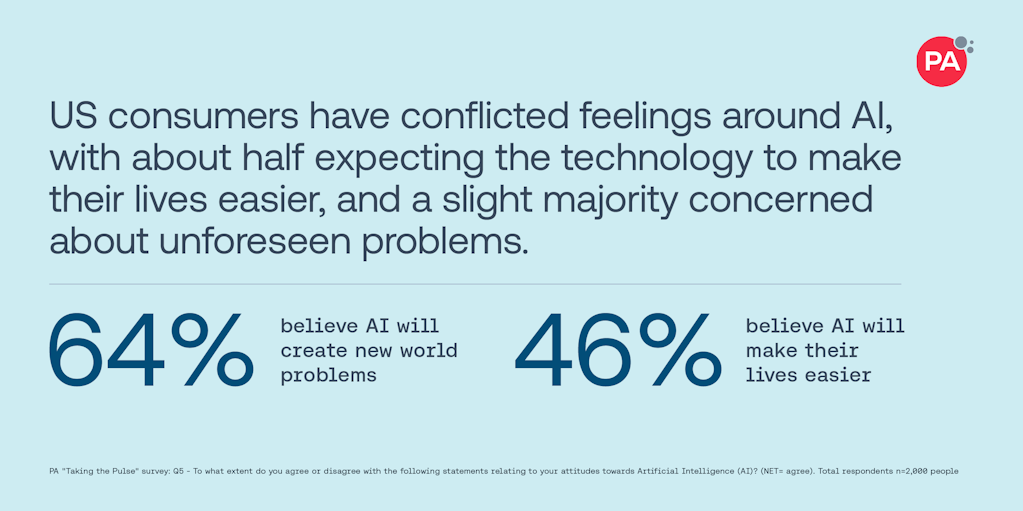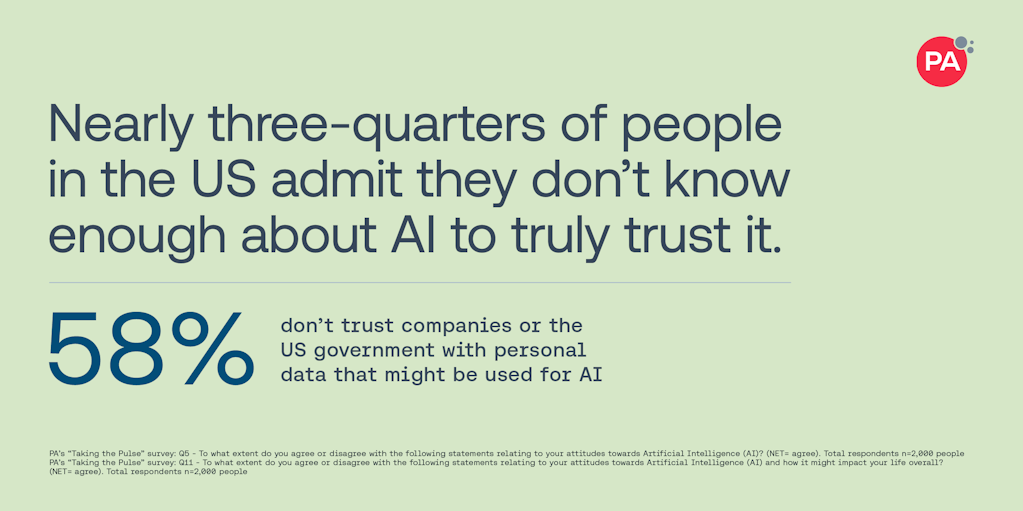PA Consulting research shows that US consumers are distrusting towards AI, despite acceptance that the technology can positively impact their life
Tags
The latest research from PA Consulting (PA), the global company bringing ingenuity to life, highlights tensions around Artificial Intelligence (AI). The first of PA’s “Taking the Pulse” survey series – which explores the impact of disruptive technologies on life in the United States – found that 64% of US respondents believe AI will create new problems for the world, while nearly half (46%) of Americans said that AI will make their life easier.

Highlights include:
Two in three people within the US (69%) are scared by AI, and 72% expressed that they don’t know enough about AI to trust the technology, leading to far reaching consequences for society.
- US respondents do not trust companies (58%) or the US government (58%) with data that might be used for AI, and are concerned that it might make them more prone to being monitored (65%) or hacked (54%).
- Seven in ten people (71%) agree that AI needs to be better regulated. Most said that they would trust information from an independent US regulator (73%).

Consumers place the blame on the industry for holding back information for their lack of trust in AI.
- Half of the respondents (54%) said the language around AI is too complex to understand.
- Six in 10 (65%) said that companies care more about protecting the AI and holding back information on how the tech works than being transparent with customers.
- As a result, only 35% of respondents were willing to share their data with businesses developing AI.

Yet despite fears and apprehension, consumers are willing to use AI across different parts of their life if the benefits are clear (55%). Companies creating and utilizing AI technology must be better at explaining the benefits of their product or service to potential users. For instance:
- US consumers are open to using AI for their personal health if it provides them with more accurate diagnoses (61%) or personalized treatment plans (52%).
- Respondents said they would be open to AI if it improved access to goods/services globally (50%), made products cheaper than hand-made goods (47%), or provided them with personalized financial advice (43%).
- Half of US consumers would be happy for AI to take over the parts of the job they don’t enjoy (50%) and feel it can help them focus on more meaningful parts areas of their role (48%).
- Technology (39%) and healthcare (34%) companies are the most trusted industries to develop AI that consumers would use, so partnering with them on new innovations would improve perceptions.
The research leads to three main takeaways for US leaders:
- The use of AI by companies will become increasingly inevitable as AI provides a means to gain competitive advantage and increased value creation through higher productivity, efficiency, and the ability to generate new insights and curated experiences. As companies make the move to increase adoption of AI, businesses need to ensure that the ability to provide transparent, ethical, and bias-fee AI solutions become integrated with the purpose and values of a company. We need to treat the provision of transparent and trusted AI as a core capability, just like we do with financial and operational discipline. Our survey illustrates consumers will demand this.
- Governments face a significant challenge in developing regulations that promote fair use of AI without impeding creativity and innovation. As a result, widespread adoption of regulations may take some time. In the interim, businesses must adopt mechanisms that demonstrate fair use of their data and provide transparency about when and how AI is being utilized. Similar to current ESG and sustainability reporting, companies will need AI-type reporting mechanisms that can offer assurance that supports the purpose and values of a business. By providing this transparency, enterprises can build trust with customers, investors, and stakeholders, which can ultimately lead to improved business outcomes.
- Businesses should continuously monitor and improve AI implementations. They should evaluate their AI systems to ensure they are operating as intended and not producing unintended consequences or biases. They should also be open to feedback from customers and incorporate that feedback into future AI development and improvement. Companies should foster a culture of AI accountability for the ethical use of AI, with clear ownership and responsibility for ensuring that AI is used fairly, transparently, and responsibly – this will reinforce the use of AI in the purpose and values of a business, leading to increased customer loyalty and trust.
Alwin Magimay, global head of AI at PA Consulting, said: “Our US AI survey respondents said they were more likely to accept AI as a positive, helpful tool if companies made it clear how AI is being adopted within their businesses and how their data is being used to support this. Once lost, consumer trust is extremely hard to restore. US companies using AI must make efforts to protect, sustain, and implement ethical behavioral governance, and enhance trust in AI as a critical corporate asset. Leaders must design AI solutions that are easy to understand and implement for the average US consumer, with increased focus on transparency and trust.”
Methodology
This “Taking the Pulse” research was conducted by PA Consulting as part of an online survey. The study was conducted in the US between March 3, 2023 – March 14, 2023, and surveyed 2,000 nationally representative respondents according to age, gender, region, ethnicity, and employment status. Respondents who took part were specifically signed up to the panel to take part in research projects like this.
Explore more






